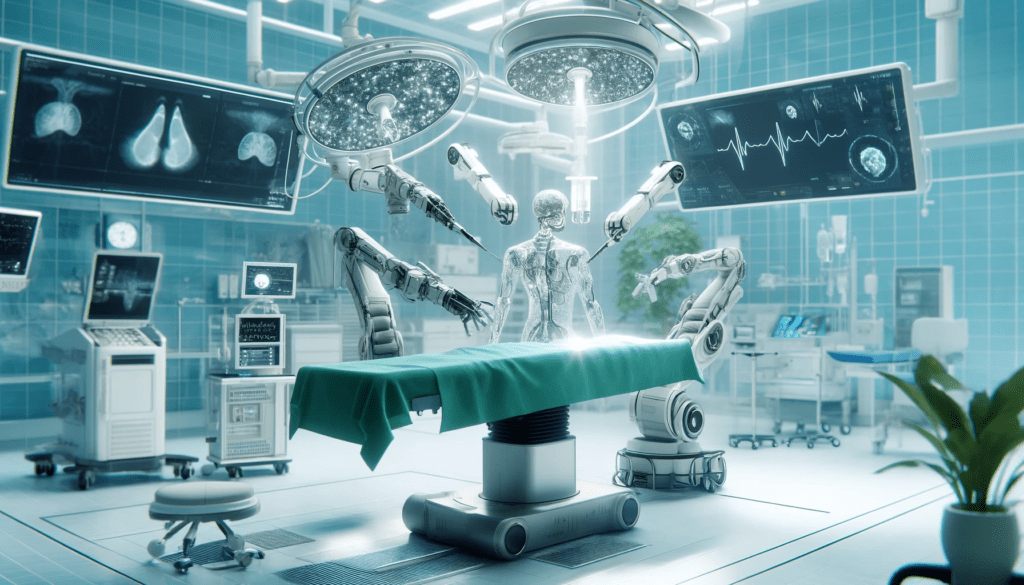Introduction
Artificial Intelligence (AI) is revolutionizing numerous industries, and healthcare is at the forefront of this transformation. With its ability to analyze vast amounts of data quickly and accurately, AI is enhancing the capabilities of medical professionals and improving patient care. From early disease detection to personalized treatment plans, AI is poised to redefine the landscape of healthcare. As AI continues to evolve and integrate more seamlessly into the healthcare system, we can expect to see even greater advancements in patient outcomes and medical practices. With the potential to revolutionize how medical decisions are made and treatments are administered, AI is paving the way for a more efficient, effective, and patient-centered healthcare system.
This article delves into the current state of AI in healthcare, exploring its benefits, challenges, and future prospects. We will examine how AI is improving diagnostics, personalizing patient care, and streamlining administrative tasks. Additionally, we will address the ethical and privacy concerns associated with AI and discuss the technological and implementation barriers that need to be overcome. Finally, we will look ahead to the future of AI in healthcare, considering emerging technologies and the role of policy and regulation in shaping its development.
Section 1: The Current State of AI in Healthcare
1.1 History and Evolution
The integration of AI in healthcare has evolved significantly over the past few decades. Initially, AI was used primarily for research purposes, but advances in computing power and data availability have expanded its applications. Key milestones include the development of expert systems in the 1970s, which laid the groundwork for modern AI applications, and the more recent advancements in machine learning and deep learning algorithms that have dramatically improved the accuracy and efficiency of AI systems in healthcare.
1.2 Current Applications
AI is currently being used in a variety of applications within healthcare. Diagnostic tools and imaging systems leverage AI to analyze medical images and detect abnormalities with high precision. AI is also used in personalized medicine to tailor treatments based on an individual’s genetic makeup, lifestyle, and other factors. Additionally, AI enhances operational efficiency by automating administrative tasks such as scheduling, billing, and patient record management, thereby reducing the burden on healthcare providers and allowing them to focus more on patient care (RCP Journals) (GAO).
Section 2: Benefits of AI in Healthcare
2.1 Improved Diagnostics and Patient Outcomes
One of the most significant benefits of AI in healthcare is its ability to improve diagnostic accuracy and patient outcomes. AI algorithms can analyze medical images and data with a level of precision that surpasses human capabilities. For example, AI systems are being used to detect early signs of diseases such as cancer and cardiovascular conditions, leading to earlier and more effective treatments. Studies have shown that AI can reduce diagnostic errors and improve patient outcomes by providing timely and accurate diagnoses (Deloitte United States).
2.2 Personalized Treatment Plans
AI plays a crucial role in the development of personalized treatment plans. By analyzing genetic, environmental, and lifestyle data, AI can identify the most effective treatments for individual patients. This approach, known as precision medicine, tailors treatments to the specific needs of each patient, improving the efficacy of interventions and reducing the risk of adverse effects. AI-driven precision medicine is particularly beneficial in fields such as oncology, where personalized treatments can significantly improve survival rates and quality of life for patients (RCP Journals) (Medriva).
2.3 Operational Efficiency

AI enhances operational efficiency in healthcare by automating routine tasks and optimizing resource management. Administrative AI tools can handle tasks such as appointment scheduling, billing, and patient record management, freeing up healthcare providers to focus on direct patient care. Additionally, AI can analyze large datasets to identify inefficiencies and recommend improvements, leading to cost savings and better resource allocation. These efficiencies ultimately result in better patient care and a more sustainable healthcare system (GAO).
Section 3: Challenges of AI in Healthcare
3.1 Ethical and Privacy Concerns
The use of AI in healthcare raises significant ethical and privacy concerns. AI systems rely on vast amounts of data, which must be collected, stored, and analyzed. Ensuring the security and privacy of this data is paramount to maintaining patient trust. Additionally, there are ethical considerations related to the use of AI in decision-making processes, particularly when it comes to life-and-death decisions. It is crucial to establish clear guidelines and regulations to address these concerns and ensure that AI is used responsibly and ethically in healthcare (Deloitte United States) (Medriva).
3.2 Technological and Implementation Barriers
Integrating AI into existing healthcare systems poses several technological and implementation challenges. Many healthcare organizations lack the necessary infrastructure and technical expertise to effectively deploy AI solutions. Additionally, AI systems must be interoperable with existing electronic health record systems and other healthcare technologies. Overcoming these barriers requires significant investment in technology and training, as well as collaboration between healthcare providers, technology companies, and policymakers (RCP Journals) (GAO).
3.3 Resistance to Adoption
Resistance to adopting AI technologies is another significant challenge in healthcare. Healthcare professionals may be skeptical of AI’s capabilities or fear that it could replace their roles. To address this resistance, it is essential to provide comprehensive training and education on the benefits and limitations of AI. Demonstrating the value of AI in enhancing patient care and supporting healthcare professionals can help alleviate concerns and encourage wider adoption (Deloitte United States) (Medriva).
Section 4: Future Prospects of AI in Healthcare
4.1 Emerging Technologies

Emerging technologies such as robotic surgery, virtual health assistants, and telemedicine are set to further revolutionize healthcare. AI-powered robotic surgery systems can perform complex procedures with greater precision and less invasiveness than traditional methods. Virtual health assistants can provide patients with real-time medical advice and support, while telemedicine platforms enable remote consultations and monitoring, improving access to healthcare services, especially in underserved areas (RCP Journals) (Deloitte United States).
4.2 Policy and Regulation
Government policies and regulations play a critical role in shaping the future of AI in healthcare. Policymakers must develop frameworks that ensure the ethical use of AI, protect patient privacy, and promote equal access to AI-driven healthcare solutions. International collaboration and standard-setting are essential to address global challenges and opportunities in AI healthcare. By establishing clear guidelines and encouraging innovation, policymakers can help drive the responsible and effective use of AI in healthcare (GAO) (Deloitte United States).
4.3 Long-Term Vision
The long-term vision for AI in healthcare is one of continuous improvement and innovation. As AI technologies advance, they will enable more personalized, efficient, and inclusive healthcare experiences. The potential for AI to transform traditional healthcare paradigms is immense, promising a future where medical treatments are tailored to individual needs, and healthcare delivery is more proactive and preventive. By embracing AI advancements, healthcare systems can improve patient outcomes and achieve greater sustainability (Medriva).
Conclusion
In conclusion, AI is poised to transform healthcare by enhancing diagnostics, personalizing treatments, and improving operational efficiency. However, significant challenges such as ethical considerations, data privacy concerns, and regulatory hurdles must be overcome to fully realize the potential of AI in healthcare. Stakeholders at all levels – from healthcare providers to policy makers to technology developers – must work together to address these challenges and create a future where AI plays a central role in delivering high-quality, accessible healthcare to all.
